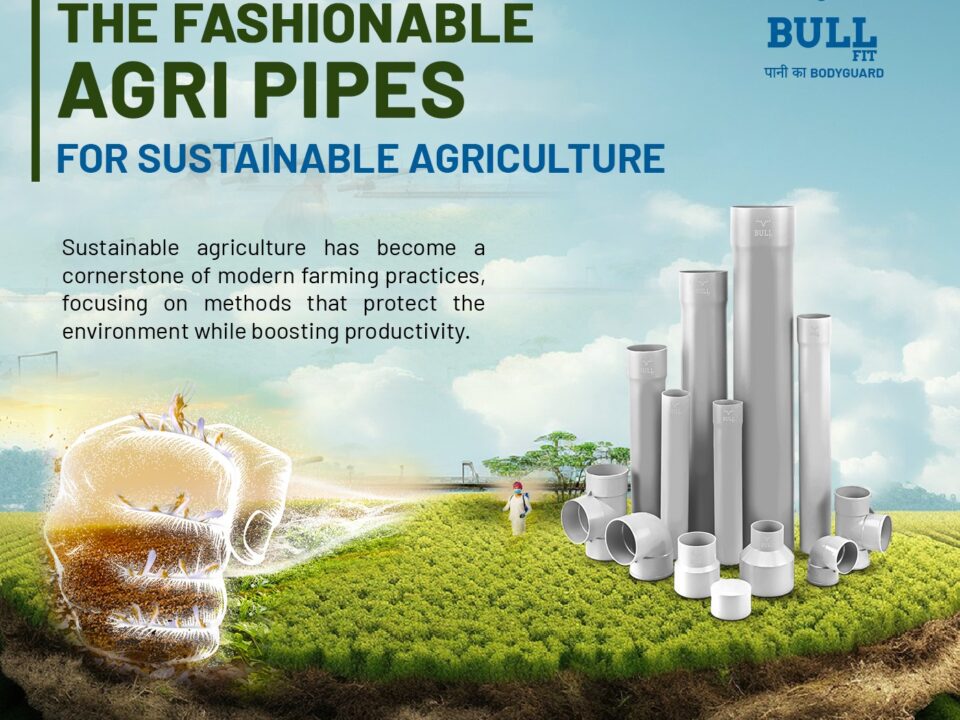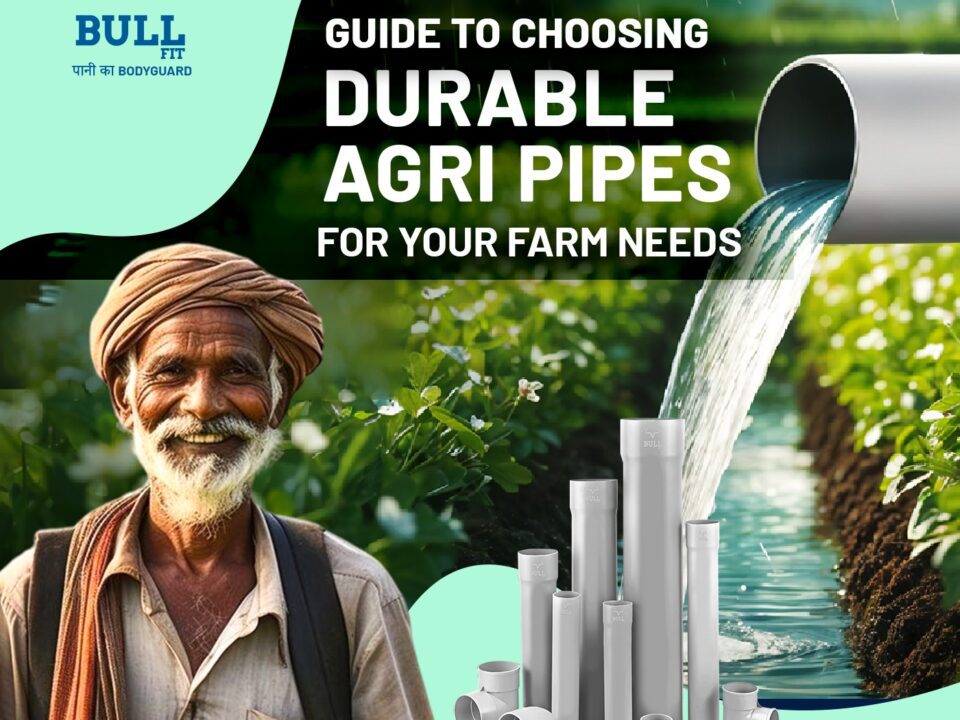
How to Identify the Best Quality PVC Pipes: A Comprehensive Guide Featuring Bull Fit Pipes
July 12, 2024
Ensure Efficient Drainage: High-Quality SWR Pipes and Fittings for a Cleaner Tomorrow : BullFit Pipes
October 2, 2024Boost Agricultural Efficiency: Reliable Agri Pipes and Fittings for Sustainable Water Management : Bullfit Pipes
In modern agriculture, efficient water management is critical to ensuring sustainable crop production. With the growing demand for food and limited water resources, farmers face the challenge of maximizing water use while minimizing waste. This is where agri pipes and fittings play a vital role in optimizing irrigation systems, enhancing water distribution, and ultimately boosting agricultural efficiency. The right pipes and fittings can contribute to higher crop yields, reduced water consumption, and long-term sustainability, which are essential in meeting the challenges of today’s agricultural industry.
Benefits of Agri Pipes and Fittings for Water Management
1. Efficient Water Distribution
Agri pipes and fittings ensure that water is distributed evenly and efficiently across agricultural fields. This helps in reducing water wastage, improving soil moisture retention, and ensuring that crops receive the optimal amount of water, promoting healthy growth.
2. Durability and Longevity
High-quality agri pipes are built to withstand harsh environmental conditions, including extreme temperatures, soil conditions, and chemical exposure. This durability ensures a longer lifespan, reducing the need for frequent replacements and lowering maintenance costs.
3. Cost-Effective Solutions
By minimizing water waste and enhancing irrigation efficiency, agri pipes help farmers cut down on operational costs. Fewer repairs, reduced water bills, and lower energy consumption make these fittings a cost-effective solution for sustainable agriculture.
4. Versatility in Application
Agri pipes and fittings can be used for various types of irrigation systems, including drip irrigation, sprinkler systems, and flood irrigation. Their versatility makes them suitable for different crops and soil types, allowing farmers to customize their irrigation strategies based on specific needs.
5. Environmental Sustainability
Water conservation is one of the most significant challenges in agriculture today. Agri pipes and fittings contribute to the sustainable use of water resources, reducing the environmental impact of farming activities. By optimizing water usage, they support eco-friendly farming practices that align with global sustainability goals.
6. Improved Crop Yields
When crops receive consistent and adequate water supply through reliable irrigation systems, the chances of higher yields increase. This leads to better profitability for farmers and contributes to food security, especially in regions where water scarcity is a concern.
Types of Agri Pipes and Fittings
1. PVC Pipes
PVC pipes are lightweight, easy to install, and offer excellent resistance to chemicals and corrosion. They are ideal for both above-ground and underground irrigation systems.
2. HDPE Pipes
High-density polyethylene (HDPE) pipes are known for their flexibility, strength, and resistance to extreme weather conditions. They are commonly used in drip and sprinkler irrigation systems due to their durability and low maintenance requirements.
3. Drip Irrigation Pipes
Drip irrigation pipes allow for precise water delivery directly to the roots of the plants. This minimizes water loss through evaporation and runoff, making it one of the most efficient water management systems.
4. Sprinkler Fittings
Sprinkler fittings are designed to deliver water in a spray, simulating natural rainfall. These fittings are ideal for crops that require even water distribution across large areas.
Conclusion
Investing in reliable agri pipes and fittings is a smart choice for any farmer looking to enhance their irrigation system and improve agricultural efficiency. Not only do these products help in conserving water, but they also reduce operational costs and increase crop yields. Sustainable water management is the backbone of modern agriculture, and with the right tools in place, farmers can ensure long-term productivity and environmental responsibility.
Whether you’re setting up a new irrigation system or upgrading an existing one, the right agri pipes and fittings can make all the difference in achieving sustainability and efficiency in water management. With the growing focus on resource conservation, investing in durable, versatile, and eco-friendly agri pipes is not just beneficial—it’s essential.
FAQs
1. What are agri pipes and fittings used for in farming?
Agri pipes and fittings are used to optimize water distribution in irrigation systems, ensuring that crops receive adequate water for healthy growth.
2. How do agri pipes help in water conservation?
Agri pipes help reduce water waste by delivering water efficiently and evenly across fields, minimizing runoff and evaporation.
3. Which type of agri pipe is best for drip irrigation?
HDPE and PVC pipes are commonly used for drip irrigation due to their durability and flexibility.
4. Are agri pipes suitable for all types of irrigation systems?
Yes, agri pipes are versatile and can be used for drip, sprinkler, and flood irrigation systems, depending on the needs of the farm.
5. How often do agri pipes need to be replaced?
High-quality agri pipes can last for several years with proper maintenance, especially those made from durable materials like PVC and HDPE.




